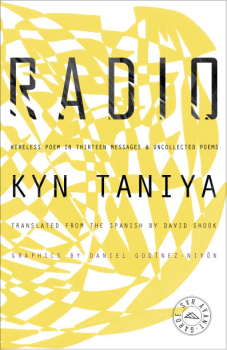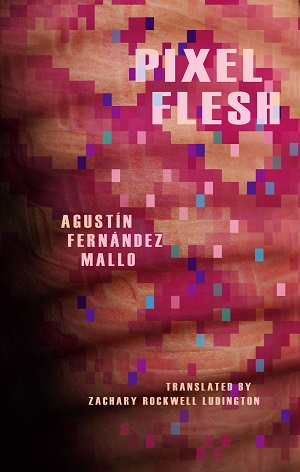
Review by Vicent Moreno
When Nocilla Dream, the first novel by Agustín Fernández Mallo, was published in Spain in 2006, it caused a seismic movement in the slow-moving and mostly predictable Spanish literary field. Published by a small press, the novel achieved a popularity only reserved to established literary figures and big publishers. While Fernández Mallo had already authored a couple of books of poetry, the instant success of his novel propelled his career; since then, he has published several novels, has penned a couple of essays on poetics and cultural theory, has won national and international awards and recognitions, and his works have been translated into various languages. Pixel Flesh, which appeared in Spain in 2009, was his first book of poetry after the publication of Nocilla Dream and it is his first book of poems translated into English. The volume is published by Cardboard House Press, a small independent publisher, which continues to lead in its drive to find and make available some of the best Spanish-language poetry to an American audience. This bilingual edition is translated by Zachary Rockwell Ludington and made possible, in part, by a grant from the PEN/Heim Translation fund. The best translations are always born out of a personal interest or passion in the work to be translated and this is clearly the case in Ludington’s precise and nuanced English rendering of Pixel Flesh (Carne de Píxel).
As a whole, Pixel Flesh can be read as a meditation on love, loss, and memory. Its format is a compilation of prose poems which, strung together, read like a long and fragmented poetic love letter with some caveats. For one, it is written from the perspective of loss, it does not project love into the future, but rather it looks at its past; it is the punctilious examination of a love affair. Like the pixel to which the title refers, the poetic voice zooms in obsessively to events, situations, moments, that make up the poetic voice’s love story. Interestingly, the only poetry written in verse in the book is actually not the author’s, but excerpts from a scientific article taken from the Spanish newspaper, El País. This bold move has two implications: on the one hand, it highlights Fernández Mallo’s understanding of science as a form of poetry, and on the other hand, it displays a very Duchampian gesture, ultimately signifying that anything is susceptible of becoming art in the right context or seen through the right eyes.
Scientific language appears frequently in the book, often as a metaphor of a stable and pure referent that lovers, as lovers do, try to circumvent in order to construct or understand their own reality: “you didn’t know the Principle of Least Action by which light [everything in general] seeks the quickest path to travel between two points (23) or “Your door, the Street, the hill. There is in this kind of goodbye a strange aquatic anti-law [you were crying, it was raining] that submerges Archimedes’ Principle and invalidates it” (21). Each of these images (the walk around the city, the goodbye in the rain) are motifs repeated throughout the book, to which the poetic voice will come back again and again, adding and subtracting information. Pixel Flesh is a highly intertextual work that opens up all sorts of hallways and windows into other forms of art, into other texts and disciplines. The references are sometimes direct: Blade Runner, Wittgenstein, Warhol, and pop music, among others, appear in the book as a very eclectic and, in appearance, incongruous amalgam of quotes and allusions that are a trademark of Fernández Mallo’s style. Ultimately, however, it is the reader who holds the key to venture into new doors and corridors. This makes each new reading of the book a new experience, rendering it practically inexhaustible in connotations and suggestiveness. For the sake of this review, I will just focus on three major references that stood out during my reading and which correspond to three of the discourses with which the author plays and pays homage to (philosophical, literary, and cinematic).
While Wittgenstein is a main influence in Fernández Mallo (after all, he has a collection of poetry titled Yo siempre regreso a los pezones y al punto 7 del Tractatus [I always return to the nipples and to the remark 7 of the Tractatus) and it appears as a direct reference in Pixel Flesh, it is Roland Barthes and its A Lover’s Discourse that resonate in this book. For one, both works are hybrids or mutants, they are hard to pin down as belonging to a specific genre and they are plagued with references and dialogs with other works. In a way, both start from the personal experience of love to try to conceptualize it and universalize it. Fernández Mallo collects moments, sensations that sometimes he calls “pixelados” [pixelations] and that conform a sui generis experience of the love story. Similarly, Barthes would call this the “Image-repertoire”, that is, the individual collection of subjective realities that the lover has about their particular relationship with the loved one, a unique idiolect that is however shared among those who love or have loved. The language of love is at once unique and universal: “What I saw in your eyes no one ever saw before, that we were the secret life of water, and an interplay of bodies to revalidate that cipherless escape by which a human being is something more than a bit of saliva” (19).
Another clear influence in Fernández Mallo is the language of film and cinematography. Some of the poems in Pixel Flesh in fact almost read as script directions, a choreographed scene that the lovers act out: “You were so beautiful, so whole with your pointy boots on that trip, the most thorough and western woman I had ever seen, light dominated by your hands, sentences: a drafting pen between your lips, astounded balance as you seasoned the fish” (47). The film Journey to Italy is mentioned a few times and one can see how that story of a disintegrating marriage is an apt background for the book. However, it is Michelangelo Antonioni’s vision and aesthetics, his elliptical and elusive plots that echo throughout these poems. The peripatetic characters of Pixel Flesh are reminiscing of Antonioni’s characters as they navigate urban landscapes and personal ennui in an intimate travelogue. We are never told the whole story, but are left to piece it together. Much like Antonioni’s trademark use of “dead time” in his movies, Fernández Mallo obsessively focuses on elements in appearance outside the story to elicit an emotional reaction in the reader who draws its own conclusions on how to connect them: “We circled the city. The sky ionized and dark, you offered me a Lucky [star between your fingers]. Within a radius of 2000 km around Earth there are more than 2 million kilos of scrap, the newspaper said: satellites, rockets, devices disintegrated in their circling” (89).
Finally, in this free play of associations that Pixel Flesh provokes, I can’t help but think of Julio Cortázar. Like the Argentinean author, Fernández Mallo possesses an understated romanticism that is allowed to shine in this book of poems. Pixel Flesh echoes the famous chapter 93 from Rayuela (Hotspot), a moment where Horacio lets go, so to speak, penning a love letter that is also a reflection on what it means to love, its language (“El amor, esa palabra…” [“Love, that word”]). Compare these two excerpts on the realization that what lovers feel is not that special, that it can and will be replicated in other arms, in other spaces: Pixel Flesh: “that everyone is one and, what’s more, not numerable, that other women will come, that other men will come, that it’s scary to think about the extent to which we’re all interchangeable” (13) and Rayuela/Hopscotch: “Of course you’ll be cured, because you’re living in health, after me it’ll be someone else, you can change things the way you change a blouse”.
The reader who enters Pixel Flesh, and in general the author’s universe, with an open mind and ready to be led down the rabbit hole of free associations will be doubly satisfied. While the text connects with the reader on a purely aesthetic and even affective level, thanks to a translation that stays true to the feeling of the original, it finds a more profound meaning in its invitation to the reader (that Baudelaire’s-like “invitation au voyage”) to explore, imagine, and see how this pixel of a work inserts itself in the larger picture of culture’s understandings of love across poetry and art, philosophy and sciences.
Pixel Flesh is available now through Cardboard House Press.


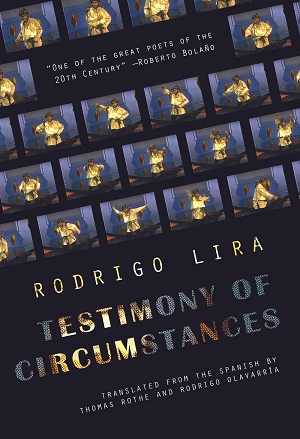 Testimony of Circumstances, by Rodrigo Lira
Testimony of Circumstances, by Rodrigo Lira Litane, by Alejandro Tarrab
Litane, by Alejandro Tarrab Cadavers, by Néstor Perlongher
Cadavers, by Néstor Perlongher Collection by Roger Santiváñez
Collection by Roger Santiváñez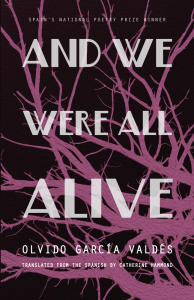 Collection by Olvido García Valdés
Collection by Olvido García Valdés Luna Park, by Luis Cardoza y Aragon
Luna Park, by Luis Cardoza y Aragon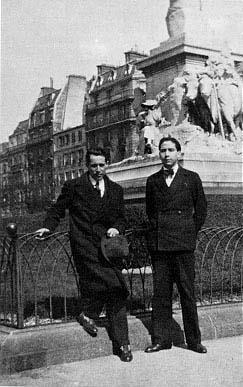 Luna Park (1924, 2016) is Luis Cardoza Y Aragón’s first collection of poetry. It is translated from the Spanish by Anthony Seidman, thrust into the thick of this decade’s hazy Twitter feed by Alan Mills, and steeped in the kinetic energy of Daniel Godínez-Nivón’s graphics.
Luna Park (1924, 2016) is Luis Cardoza Y Aragón’s first collection of poetry. It is translated from the Spanish by Anthony Seidman, thrust into the thick of this decade’s hazy Twitter feed by Alan Mills, and steeped in the kinetic energy of Daniel Godínez-Nivón’s graphics.